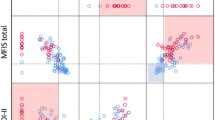Abstract
Purpose
In this study, we estimate the impact of a recent relapse on physical and mental health in subjects with relapsing-remitting multiple sclerosis (RRMS) using validated patient-reported outcome (PRO) measures.
Methods
Subjects enrolled in the Comprehensive Longitudinal Investigation of MS at the Brigham and Women’s Hospital with RRMS were eligible for enrollment. Subjects with a clinical visit within 45 days of a relapse were identified and divided into groups based on whether the relapse occurred before (recent relapse) (n = 59) or after the visit (pre-relapse) (n = 31). A group of subjects with no relapses was also identified (remission) (n = 336). PRO measures in these three groups were compared. All outcomes were compared using a t test and linear regression controlling for age, disease duration, sex, and EDSS.
Results
Subjects with a recent relapse had significantly worse functioning on several physical and mental health scales compared to subjects in remission even after adjusting for potential confounders. Subjects with a recent relapse also showed significant deterioration on PRO measures over 1 year compared to subjects in remission (P < 0.05 for each comparison). Subjects in the pre-relapse group were not significantly different than subjects in remission.
Conclusions
Clinical relapses have a measurable effect on PRO in subjects with RRMS.
Similar content being viewed by others
References
Hemmett, L., Holmes, J., Barnes, M., & Russell, N. (2004). What drives quality of life in multiple sclerosis? QJM, 97(10), 671–676.
Nortvedt, M. W., Riise, T., Myhr, K. M., & Nyland, H. I. (1999). Quality of life in multiple sclerosis: measuring the disease effects more broadly. Neurology, 53(5), 1098–1103.
Hermann, B. P., Vickrey, B., Hays, R. D., Cramer, J., Devinsky, O., Meador, K., et al. (1996). A comparison of health-related quality of life in patients with epilepsy, diabetes and multiple sclerosis. Epilepsy Research, 25(2), 113–118.
Hviid, L. E., Healy, B. C., Rintell, D. J., Chitnis, T., Weiner, H. L., & Glanz, B. I. (2011). Patient reported outcomes in benign multiple sclerosis. Multiple Sclerosis, 17(7), 876–884.
Ford, H. L., Gerry, E., Johnson, M. H., & Tennant, A. (2001). Health status and quality of life of people with multiple sclerosis. Disability and Rehabilitation, 23(12), 516–521.
Pittock, S. J., Mayr, W. T., McClelland, R. L., Jorgensen, N. W., Weigand, S. D., Noseworthy, J. H., et al. (2004). Quality of life is favorable for most patients with multiple sclerosis: A population-based cohort study. Archives of Neurology, 61(5), 679–686.
Pfennings, L., Cohen, L., Ader, H., Polman, C., Lankhorst, G., Smits, R., et al. (1999). Exploring differences between subgroups of multiple sclerosis patients in health-related quality of life. Journal of Neurology, 246(7), 587–591.
Rudick, R. A., Miller, D., Hass, S., Hutchinson, M., Calabresi, P. A., Confavreux, C., et al. (2007). Health-related quality of life in multiple sclerosis: Effects of natalizumab. Annals of Neurology, 62(4), 335–346.
Lublin, F. D., Baier, M., & Cutter, G. (2003). Effect of relapses on development of residual deficit in multiple sclerosis. Neurology, 61(11), 1528–1532.
Kalb, R. (2007). The emotional and psychological impact of multiple sclerosis relapses. Journal of the Neurological Sciences, 256(Suppl 1), S29–S33.
Halper, J. (2007). The psychosocial effect of multiple sclerosis: The impact of relapses. Journal of the Neurological Sciences, 256(Suppl 1), S34–S38.
Orme, M., Kerrigan, J., Tyas, D., Russell, N., & Nixon, R. (2007). The effect of disease, functional status, and relapses on the utility of people with multiple sclerosis in the UK. Value in Health, 10(1), 54–60.
Parkin, D., Jacoby, A., McNamee, P., Miller, P., Thomas, S., & Bates, D. (2000). Treatment of multiple sclerosis with interferon beta: An appraisal of cost-effectiveness and quality of life. Journal of Neurology, Neurosurgery and Psychiatry, 68(2), 144–149.
Bethoux, F., Miller, D. M., & Kinkel, R. P. (2001). Recovery following acute exacerbations of multiple sclerosis: From impairment to quality of life. Multiple Sclerosis, 7(2), 137–142.
Nortvedt, M. W., Riise, T., Myhr, K. M., & Nyland, H. I. (2000). Quality of life as a predictor for change in disability in MS. Neurology, 55(1), 51–54.
Gauthier, S. A., Glanz, B. I., Mandel, M., & Weiner, H. L. (2006). A model for the comprehensive investigation of a chronic autoimmune disease: The multiple sclerosis CLIMB study. Autoimmunity Reviews, 5(8), 532–536.
Gorman, M. P., Healy, B. C., Polgar-Turcsanyi, M., & Chitnis, T. (2009). Increased relapse rate in pediatric-onset compared with adult-onset multiple sclerosis. Archives of Neurology, 66(1), 54–59.
Ware, J. E., Jr, & Sherbourne, C. D. (1992). The MOS 36-item short-form health survey (SF-36). I. Conceptual framework and item selection. Medical Care, 30(6), 473–483.
Radloff, L. (1977). The CES-D scale: A self-report depression scale for research in the general population. Applied Psychological Measurement, 1(3), 385–401.
Fisk, J. D., Pontefract, A., Ritvo, P. G., Archibald, C. J., & Murray, T. J. (1994). The impact of fatigue on patients with multiple sclerosis. Canadian Journal of Neurological Sciences, 21(1), 9–14.
Ritvo, P., Fischer, J., Miller, D., Paty, D., & LaRocca, N. (1997). Multiple sclerosis quality of life inventory: A user’s manual. New York, NY: National Multiple Sclerosis Society.
Efron, B., & Tibshirani, R. (1993). An introduction to the bootstrap. New York, NY: Chapman & Hall.
Norman, G. R., Sloan, J. A., & Wyrwich, K. W. (2003). Interpretation of changes in health-related quality of life: the remarkable universality of half a standard deviation. Medical Care, 41(5), 582–592.
Freedman, M. S., Patry, D. G., Grand’Maison, F., Myles, M. L., Paty, D. W., & Selchen, D. H. (2004). Treatment optimization in multiple sclerosis. Canadian Journal of Neurological Sciences, 31(2), 157–168.
Acknowledgments
The CLIMB study is funded in part by the Nancy Davis Foundation and Merck Serono.
Author information
Authors and Affiliations
Corresponding author
Electronic supplementary material
Below is the link to the electronic supplementary material.
Rights and permissions
About this article
Cite this article
Healy, B.C., Degano, I.R., Schreck, A. et al. The impact of a recent relapse on patient-reported outcomes in subjects with multiple sclerosis. Qual Life Res 21, 1677–1684 (2012). https://doi.org/10.1007/s11136-011-0108-0
Accepted:
Published:
Issue Date:
DOI: https://doi.org/10.1007/s11136-011-0108-0



